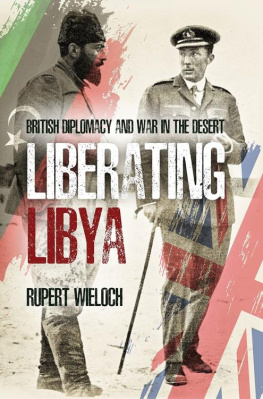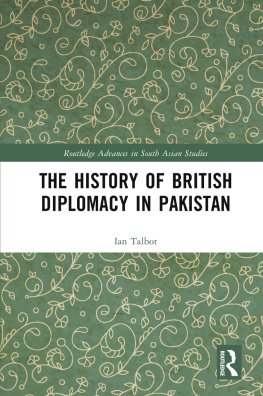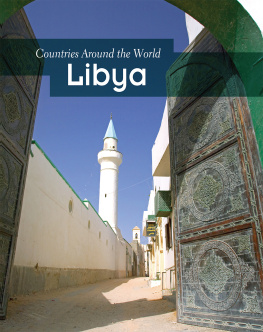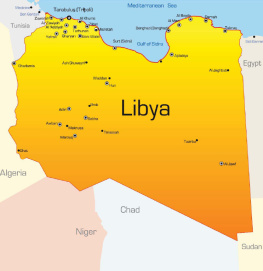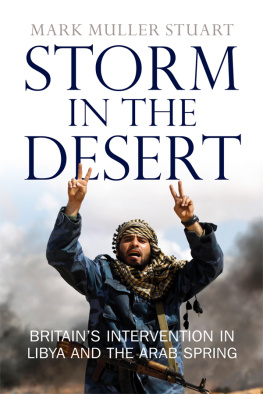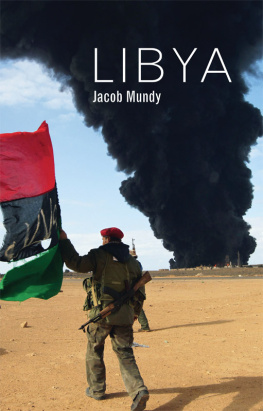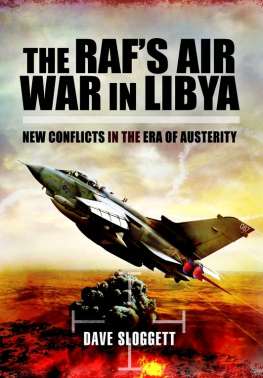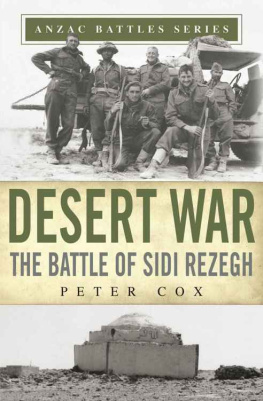Rupert Wieloch - Liberating Libya: British Diplomacy and War in the Desert
Here you can read online Rupert Wieloch - Liberating Libya: British Diplomacy and War in the Desert full text of the book (entire story) in english for free. Download pdf and epub, get meaning, cover and reviews about this ebook. year: 2021, publisher: Casemate, genre: Politics. Description of the work, (preface) as well as reviews are available. Best literature library LitArk.com created for fans of good reading and offers a wide selection of genres:
Romance novel
Science fiction
Adventure
Detective
Science
History
Home and family
Prose
Art
Politics
Computer
Non-fiction
Religion
Business
Children
Humor
Choose a favorite category and find really read worthwhile books. Enjoy immersion in the world of imagination, feel the emotions of the characters or learn something new for yourself, make an fascinating discovery.
- Book:Liberating Libya: British Diplomacy and War in the Desert
- Author:
- Publisher:Casemate
- Genre:
- Year:2021
- Rating:4 / 5
- Favourites:Add to favourites
- Your mark:
- 80
- 1
- 2
- 3
- 4
- 5
Liberating Libya: British Diplomacy and War in the Desert: summary, description and annotation
We offer to read an annotation, description, summary or preface (depends on what the author of the book "Liberating Libya: British Diplomacy and War in the Desert" wrote himself). If you haven't found the necessary information about the book — write in the comments, we will try to find it.
Rupert Wieloch: author's other books
Who wrote Liberating Libya: British Diplomacy and War in the Desert? Find out the surname, the name of the author of the book and a list of all author's works by series.
Liberating Libya: British Diplomacy and War in the Desert — read online for free the complete book (whole text) full work
Below is the text of the book, divided by pages. System saving the place of the last page read, allows you to conveniently read the book "Liberating Libya: British Diplomacy and War in the Desert" online for free, without having to search again every time where you left off. Put a bookmark, and you can go to the page where you finished reading at any time.
Font size:
Interval:
Bookmark:
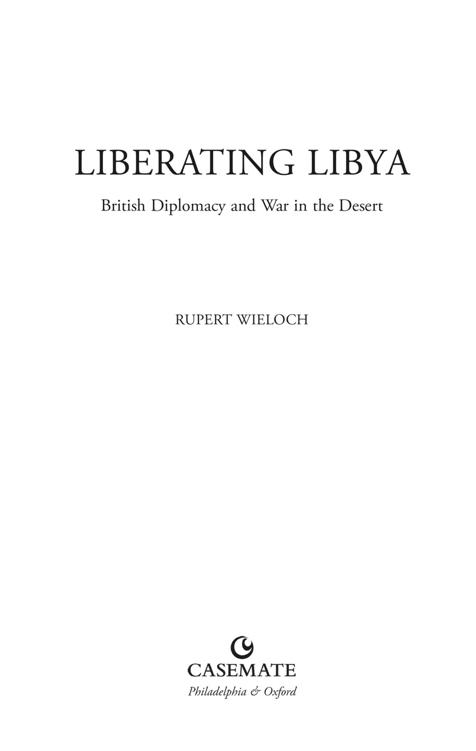
Published in the United States of America and Great Britain in 2021 by CASEMATE PUBLISHERS
1950 Lawrence Road, Havertown, PA 19083, USA
and
The Old Music Hall, 106108 Cowley Road, Oxford OX4 1JE, UK
Copyright 2021 Rupert Wieloch
Hardback Edition: ISBN 978-1-63624-082-4
Digital Edition: ISBN 978-1-63624-083-1
A CIP record for this book is available from the British Library
All rights reserved. No part of this book may be reproduced or transmitted in any form or by any means, electronic or mechanical including photocopying, recording or by any information storage and retrieval system, without permission from the publisher in writing.
Printed and bound in the United Kingdom by TJ Books
Typeset in India by Lapiz Digital Services, Chennai.
For a complete list of Casemate titles, please contact:
CASEMATE PUBLISHERS (US)
Telephone (610) 853-9131
Fax (610) 853-9146
Email: casemate@casematepublishers.com
www.casematepublishers.com
CASEMATE PUBLISHERS (UK)
Telephone (01865) 241249
Email: casemate-uk@casematepublishers.co.uk
www.casematepublishers.co.uk
To the nine soldiers awarded the Victoria Cross in Libya between April 1941 and October 1942 and the only Libyan to be awarded the Military Cross.
Corporal John Hurst Edmondson, 2/17th Australian Infantry Battalion 14 April 1941 (posthumous)
Lieutenant Colonel Geoffrey Charles Tasker Keyes MC, Royal Scots Greys 18 November 1941 (posthumous)
Rifleman John Beeley, Kings Royal Rifle Corps 21 November 1941 (posthumous)
Second Lieutenant George Ward Gunn MC, Royal Horse Artillery 21 November 1941 (posthumous)
Brigadier John Charles (Jock) Campbell DSO, MC, Royal Horse Artillery 21 November 1941
Captain Philip John (Pip) Gardner MC, Royal Tank Regiment 23 November 1941
Captain James Joseph Bernard Jackman, Royal Northumberland Fusiliers 26 November 1941 (posthumous)
Lieutenant Colonel Henry Robert Bowreman Foote DSO, Royal Tank Regiment 27 May 1942
Sergeant Quentin George Murray Smythe, Royal Natal Carabineers 5 June 1942
Mulazim Awal (Lieutenant) Saad Ali Rahouna, Libyan Arab Force 23 April 1942
When we look into the history of Libya, two aphorisms immediately spring to mind, the first is the realisation that: History is geography stretched over time. The second, attributed to Mark Twain, is that: History never repeats itself; but it rhymes.
No historian, used to finding that throughout history battles are constantly being fought over the same piece of ground, will dispute these truisms. However, in writing what will become the definitive work tracing the history of Britains interest in and relationship with Libya, Rupert Wieloch has not only confirmed their accuracy but explained in detail just why they are true. Furthermore, and most importantly, both his historical and contemporary analyses also bear out another maximone which has fallen out of favour in the West in recent times, but which our authoritarian competitors are currently demonstrating is still validFrederick the Greats observation that: Diplomacy without arms is like music without instruments.
Armies do indeed play a major role in this story, as one might expect when the author is a first-rate military historian with a distinguished Army career behind him. But this is not just a military history. Drawing on his extensive knowledge of and deep feeling for the country, Rupert Wieloch has been able to use Libya as a stage, explaining the drama of Britains long involvement with the country as a means to illustrate the role national security and defence have played in our foreign policy. It is this which is the real lesson the book imparts, and which gives it such resonance today, when we are in danger of forgetting this fundamental point.
The book is also distinguished from military and diplomatic histories by its style. Nowhere is the writing heavy, overly formal or excessively technical and detailed. Without sacrificing accuracy and balance, the author has told his story in an easily accessible and engaging way, with a great deal of personal human detail aboutand bymany of the key characters involved. This human touch, which is one of the main characteristics of Rupert Wielochs approach, not only brings out the lessons more effectively; it also acknowledges the contribution that individuals make to the way things turn out for good or ill, a fact denied by some schools of historiography.
The author starts his story in pre-Roman times, describing how, in Libya, European, African and Arabic influence and cultures have interacted over the centuries, thereby providing us with a basis for understanding the complexities of modern Libya and her relationships with other countries in todays world. The English, and later British, involvement with Libya began in earnest in the mid-17th century, with efforts to stop piracy and the seizing of white Christian slaves which had begun to be a problem a century earlier and which continued well into the 19th century, ultimately goading even the infant United States into activity, providing the US Marine Corps with its first overseas military campaign and one of the opening lines in its Corps Hymn.
The book describes how, as the 19th century progressed, Libya became a playing field for the growing competition between Britain and France, both countries seeking to expand their empires and fields of interest. The emergence of modern Turkey is also illustrated, as it played out in Libya and the other subject territories of North Africa, interacting with Western powers in the process. As an added bonus, the book provides the reader with a particular understanding of how Frances conflicted relationship with North Africa has evolved. A major part of the book is a description of the military and diplomatic history of the 20th century, including the conflicts fought on Libyan soil in World War I and World War II. Again, this explains why Italys relationship with modern Libya is so awkward. Indeed, understanding the history of French and Italian involvement in North Africa explains why todays EU finds it so difficult to develop a balanced relationship with its close neighbours to the south but why, for the UK, the relationship with North Africa for much of the last century has been somewhat more relaxed and comfortable.
Students of the Desert Campaigns of World War II will find, in the six chapters that the author devotes to this period, not only an insightful exposition of the main aspects of that campaign and the birth of Britains Special Forces, but a constant linkage of the military events to the underlying background of the rapidly evolving political process. Von Clausewitz famous quotation: Der Krieg ist eine bloe Fortsetzung der Politik mit anderen Mitteln is usually translated as: War is just a continuation of politics by other means. But, as another reknowned military historian and strategist, Maj Gen Mungo Melvin, has pointed out, Politik in German means both politics and policy; and mit means with, ie accompanied by other means, not by alternative means. Politics and policy do not stop once war starts; indeed they speed up and become more acute. Rupert Wieloch does us great service by making this essential interaction very clear.
It is in continuing to make that crucial interplay clear in describing events since 1945 that the author makes his most valuable contribution to modern strategic thinking. This part of the book does not make for comfortable reading. Rather it is a litany of failure. In the post-war period, the path of British-Libyan relations is truly paved with good intentions, poor decisions and lost opportunities. What Rupert Wieloch demonstrates in analysing this period is that a successful foreign policy must always have defence and security at its heart, and that these forms of power invariably need to be woven into a truly coherent, pro-active strategy with all other forms of power. This has always been the case, although today it has become fashionable to term this hybrid warfare. But, just as with the mistranslation of Clausewitz, hybrid warfare is often taken to be an alternative to classic, kinetic warfare, whereas in fact classic weapons and violent battle are still an essential, integral part of the whole spectrum of modern hybrid conflict.
Font size:
Interval:
Bookmark:
Similar books «Liberating Libya: British Diplomacy and War in the Desert»
Look at similar books to Liberating Libya: British Diplomacy and War in the Desert. We have selected literature similar in name and meaning in the hope of providing readers with more options to find new, interesting, not yet read works.
Discussion, reviews of the book Liberating Libya: British Diplomacy and War in the Desert and just readers' own opinions. Leave your comments, write what you think about the work, its meaning or the main characters. Specify what exactly you liked and what you didn't like, and why you think so.

